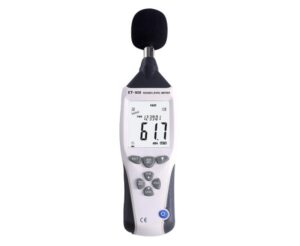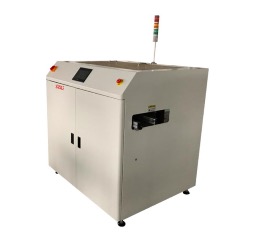A digital sound level meter is an essential tool for measuring sound levels in various environments. It provides precise, accurate readings of sound intensity, helping professionals monitor and control noise levels in residential and industrial settings. This article will explore the purpose, applications, and benefits of using a digital sound level meter in different industries.

Table of Contents
ToggleWhat is a Digital Sound Level Meter?
Is a device designed to measure sound pressure levels in decibels (dB). Unlike traditional analog meters, a digital sound level meter uses electronic components to capture and display sound data digitally. This digital format provides enhanced precision and ease of reading. These meters are widely used in noise measurement applications such as environmental monitoring, workplace safety, and acoustics testing.
How Does a Digital Sound Level Meter Work?
The primary function of a digital sound level meter is to measure the intensity of sound waves in a given environment. It captures sound using a microphone, which converts sound pressure into an electrical signal. This signal is then processed by the internal electronics and displayed as a digital readout. Most modern sound level meters offer various settings to measure different types of noise, including continuous, peak, or impulse sounds. The device can also feature frequency weighting filters, such as A-weighting or C-weighting, to adjust the readings according to specific measurement standards.
Applications of a Digital Sound Level Meter
A digital sound level meter is widely used across many industries for various purposes. In construction and manufacturing, it helps ensure that noise levels remain within regulatory limits to protect workers’ hearing and reduce environmental impact. In environmental monitoring, these meters are used to assess noise pollution and ensure compliance with local noise ordinances. Additionally, a digital sound level meter is essential for acoustical engineers to analyze sound quality in venues such as theaters, concert halls, and recording studios.
Benefits of Using a Digital Sound Level Meter
The key advantage of a digital sound level meter is its accuracy and ease of use. Unlike analog devices, which require manual calibration and interpretation of needle readings, digital meters provide clear and precise measurements. This makes them ideal for professionals who need reliable data for regulatory compliance, safety monitoring, and sound quality analysis. Moreover, many digital models feature advanced functions such as data logging, Bluetooth connectivity, and the ability to store measurement results for later analysis.
In conclusion, a digital sound level meter is a vital tool for anyone involved in noise measurement or environmental acoustics. It offers a precise, reliable way to measure sound levels in various environments, ensuring safety, compliance, and optimal sound quality. Whether used for occupational health, environmental protection, or acoustic testing, the digital sound level meter plays a critical role in managing sound in modern society.
0




